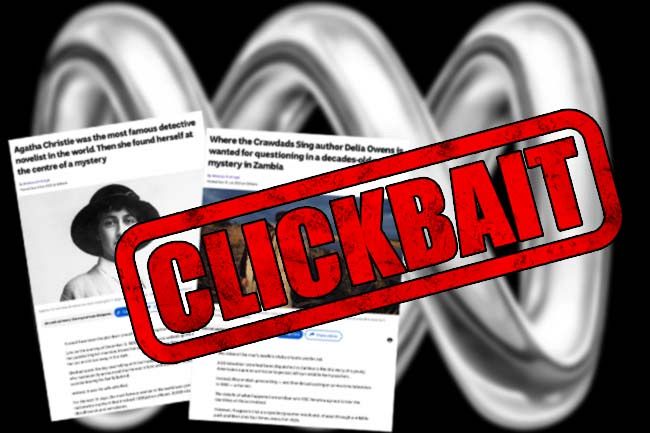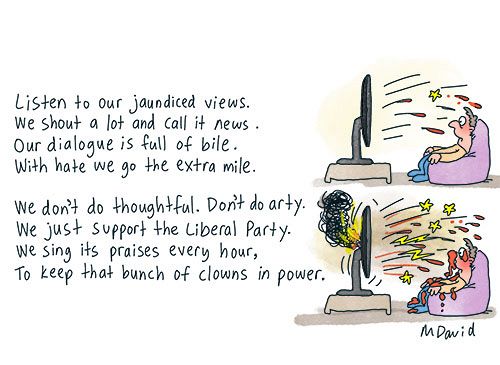Once a reliable news source, the ABC has lately been relying on borderline plagiarism and clickbait to entice readers, diminishing its previously high standards. Rosemary Sorensen reports.
AUSTRALIAN JOURNALISM is suffering death by a thousand cuts. “Whatever,” responds the populace.
There was a mini-outcry against the loss of ABC current affairs program The Drum, announced prior to Christmas and Scott Mitchell at The Saturday Paper noted what he saw as ‘strong public resonance’ against this latest cut to ABC programming. Mitchell also noted that ‘even the reach of the ABC News website is down 30 per cent on last year’.
The loss of The Drum and the re-deployment of reasonably high-profile presenters to other jobs at the ABC is not good news for anyone concerned about how news and analysis journalism is being white-anted, as the ABC flaps around trying to keep up with the flight of quality from commercial journalism.
But that’s the mere melting tip of an already diminished iceberg. If you’re still trying to rely on ABC News online to keep up with breaking news and evolving analysis, you have most likely noticed the parlous state of the click-on headlines, sometimes so dense with competing clauses as to be nonsensical, often fashionably jaunty and inappropriately crass, and with the occasional howling spelling or grammatical error that, apparently, only pedants are horrified by.
What is not so immediately obvious is how many of the stories which appear on the news feed are now written not by reporters, but by “content producers”. What do they do, these “content producers”? Like bowerbirds, they collect shiny bits and pieces to decorate their nests.
I’m going to use one particular example to suggest that, in a pathetic attempt to keep up with ruthless and unethical commercial media practices, the ABC has shifted away from quality journalism towards clickbait rehash that borders on plagiarism. It’s not the reporter/content producer’s fault, although the example I’m using does pose questions of propriety and ethics. It’s an example that began as a concern about how the duty to acknowledge books is dissipating, but it morphed into a wider concern, about what it means to “author” writing, and the way digital media is reconfiguring attitudes towards fair use and reliability.
While The New York Times has just announced it is suing Microsoft/ChatGPT for unauthorised content theft, you can easily find widespread appropriation spreading virally through digital media sites, some of which must be the result of commercial deals between news agencies and outlets. It will take something as visible and high-stakes as this legal battle to alert writers – those who have grown up with internet accessibility to huge swathes of writing, from classic literature to today’s commentary – to the ethics of borrowing without attribution (which used to be called plagiarising).
Right now, the rules are flouted with ease. This is why, I think, an ABC online story that relies almost entirely on other writers, can appear under a byline suggesting original work. It’s weird.
When you see a person’s name beneath a headline and before the story, the convention is that the words are written by that person. Sometimes, the byline credits a news agency, and when a story is pieced together by a journalist who provides context and links, the byline might become “staff and agencies”.
“Joe Bloggs in Sydney” means Joe is in Sydney, right? And if Joe is using reports from other writers or agencies, then Joe will include in his story words to the effect of “as reported by”, and maybe even note this assistance in his byline: “Joe Bloggs and agencies”.
Time to cut to the chase. When I saw an article on the ABC website retelling the mystery of Agatha Christie’s unexplained disappearance in 1926, I was puzzled by there being scant reference to the sources, even though I was aware of two recent biographies that detailed this mystery.
The story was ‘by Rebecca Armitage’, who is ‘the digital producer for the ABC's International Desk’. It didn’t make much sense that this rehash of the Christie mystery would emanate from the ABC’s International Desk, particularly when other stories by Armitage suggested she was in Jerusalem.
Neither was it clear what sources were used to write the story, which included direct speech quotes and awkward descriptions:
‘As she wandered the halls of the mansion that was meant to their forever home, something broke inside of Agatha.’
There is a hyperlink embedded in the story that suggests much of this article is based on one of the new biographies, Agatha Christie: A Very Elusive Woman by Lucy Worsley. If this had been a review of that book, then the byline would make sense, but it’s written as a feature article. Even as a feature article, however, it plays fast and loose with the sources it relies on, employing both facts (such as the number of police involved in the search for the missing writer) and the descriptive fictions used by writers attempting to add colour (such as, ‘The mood in the unlucky house grew dark’).
Confused by the inclusion of this story on the ABC news feed, I emailed Armitage to ask what sources she’d used. It seemed to me that if it was primarily the Worsley book, then that ought to be made clear. If someone has done the work to write a book, it must be frustrating to see that book plundered for the best bits; not having the debt clearly acknowledged must be infuriating. Neither that query nor a follow-up received replies but, meanwhile, the plot thickened.
Turns out the “international desk” at the ABC has something of a fancy for unsolved mysteries and salacious true crime — and for plundering other publications for the base material on which to build a yarn.
From July 2022, ‘Where the Crawdads Sing author Delia Owens is wanted for questioning in a decades-old murder mystery in Zambia’ is a long read based substantially on articles in The New York Times and The Atlantic, both of which ran earlier that month, and both of which are hyperlinked in the ABC article.
And on 25 December 2023, under a joint byline, the ABC’s international team posted a story about the unsolved 1945 mystery of the five Sodder children who either died in a West Virginian house fire or were abducted. This story, apparently pieced together for a Christmas read on account of the children disappearing on Christmas Eve all those years ago, hyperlinked various other retellings, including one from March 2022.
The original bits seem to be sentences such as, ‘Sometimes the simplest explanation can be the most compelling’, scattered throughout the long read as a reminder there’s someone actually writing this stuff.
I did think, for a moment, that maybe the “writers” whose bylines appear on such stories (not these on the ABC website, but there’s a lot of this kind of rehashing going on and, in many cases, the writer is probably not being paid much, if anything) might be tempted to use ChatGPT to “produce” this “content”. AI, while stylistically tending towards cliché, is efficient rather than flowery, although I guess you can ask it to go flowery if that’s your thing.
Curiouser and curiouser, as Alice said in Wonderland: if you ask ChatGPT if it’s okay to put your name on a story you ask it to write for you, it answers:
‘Certainly! I can help you generate a story and you can put your name on it. Keep in mind that the generated content will be a collaboration, with the creative input coming from both you and the AI.’
If you ask ChatGPT for a definition of plagiarism, you get:
‘Plagiarism is the act of using someone else's ideas, words, or work without giving them proper credit or without obtaining permission. It is a form of intellectual dishonesty and a violation of ethical and academic standards.’
This will, no doubt, be one of the key arguments put forward in The New York Times lawsuit.
The point is, why does a byline appear on these rehashes at all? Is it, in the ABC’s case, a way of legitimising its journalism, to shore up diminishing numbers of reporters who are actually reporting compared with those whose job it is to scour other sites for what are deemed catchy stories? Or is this part of a managerial mindset that instils in workers the belief that all writers and all words are equal, and all content is up for grabs?
As for the dodgy way someone who is sitting at a computer in Sydney can be said to be “in Jerusalem” apparently because they are reading lots of words about Jerusalem — well, that’s just astonishing.
However, if you think this is disturbing, coming from a hitherto trusted source such as the Australian Broadcasting Commission, let’s take a moment to be grateful that there are still brilliant, conscientious, experienced journalists working there, although they must feel under siege.
As Brad Ryan, ‘digital producer for the ABC's North America bureau in Washington DC’, reported on the day The New York Times filed its suit against Microsoft and OpenAI, at stake is the entire framework on which the democratic edifice depends.
Ryan, summarising this landmark case, quotes The New York Times:
‘With less revenue, news organisations will have fewer journalists able to dedicate time and resources to important, in-depth stories, which creates a risk that those stories will go untold. Less journalism will be produced and the cost to society will be enormous.’
What The New York Times is also saying, between the lines of its demands for fairness in support of those people and organisations who do the work now plundered by these powerful new technologies, is that soon there might not be much being created that’s worth plundering.
Rosemary Sorensen was a newspaper books and arts journalist, based in Melbourne, then Brisbane, before moving to regional Victoria where she founded Bendigo Writers Festival, which she directed for 13 years.
Related Articles
- ABC watches its language concerning alleged Israeli genocide
- ABC dissolves arts coverage prompting anger from sector
- ABC cuts political news coverage: Fantales over foreign affairs
- The ABC of talking to neighbours
- Politicised attacks are damaging the ABC’s editorial independence
 This work is licensed under a Creative Commons Attribution-NonCommercial-NoDerivs 3.0 Australia License
This work is licensed under a Creative Commons Attribution-NonCommercial-NoDerivs 3.0 Australia License
Support independent journalism Subscribe to IA.
















